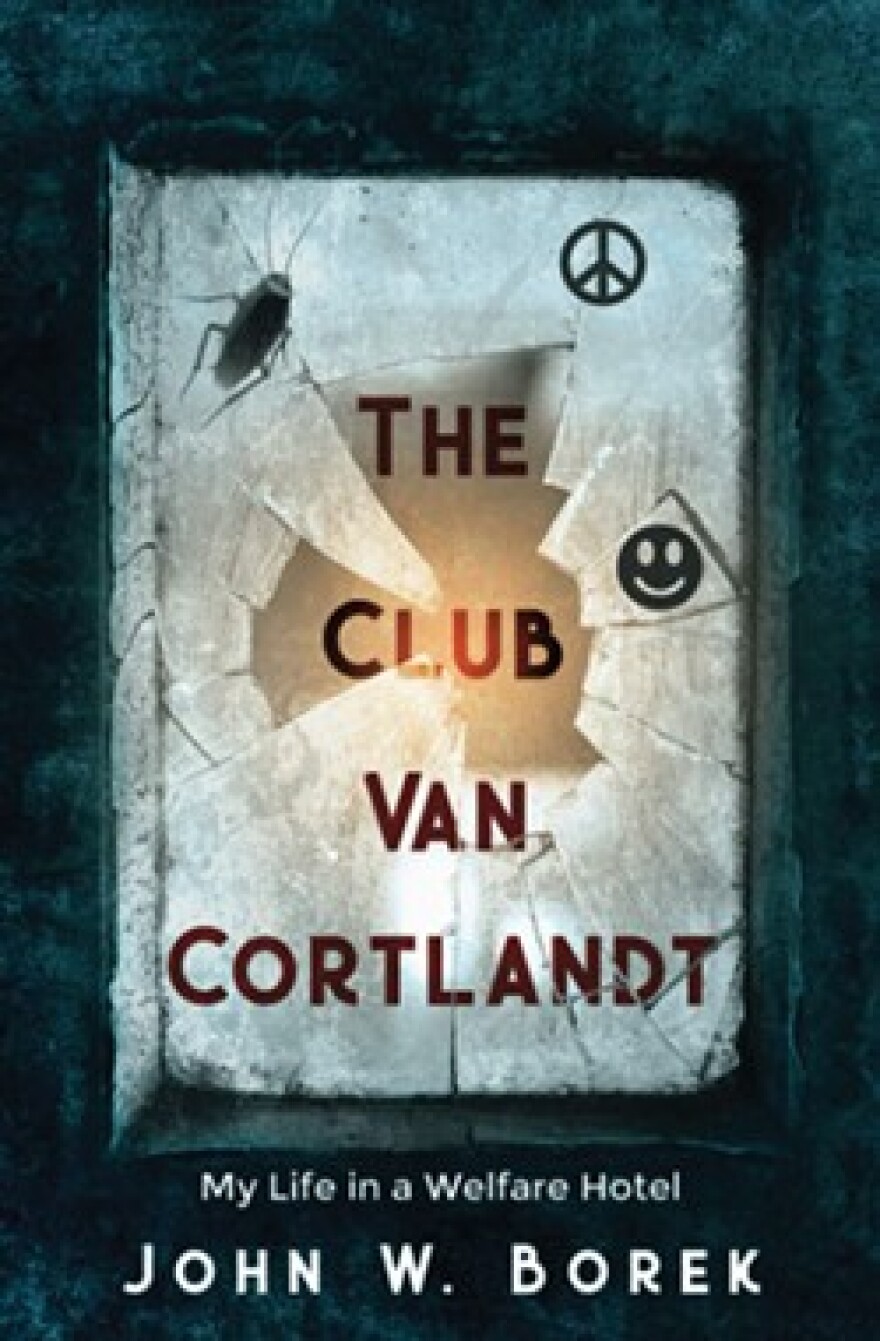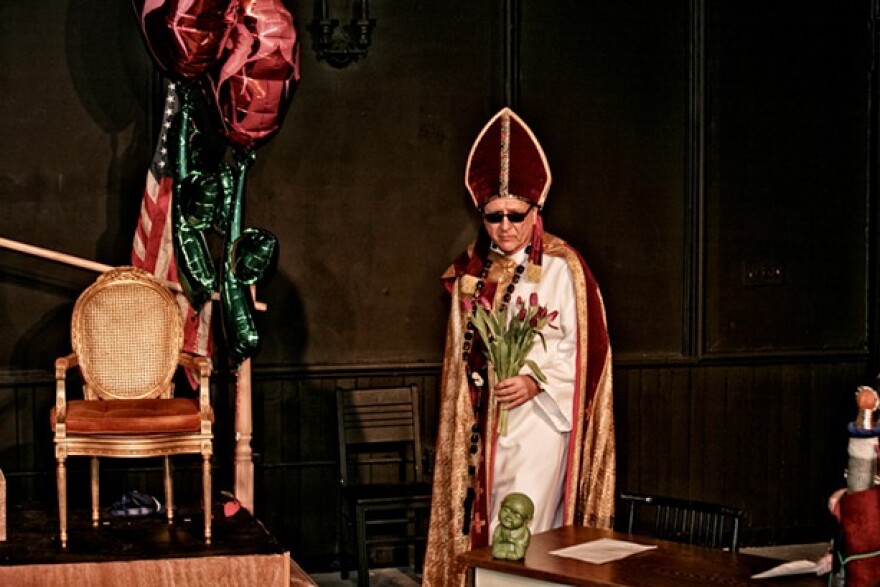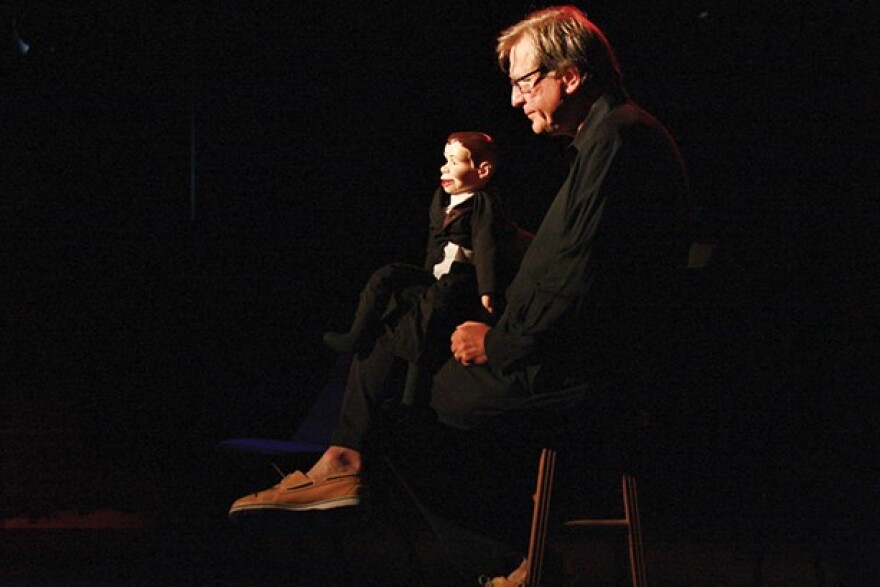It took a while for John Borek, one-time bookstore owner and a self-described quiet man, to become an open book himself. But once he did, the pages turned swiftly.
Rochester hasn’t seen a conceptual artist like Borek -- a typical-looking, 70-ish white guy who refers to himself as The Professor of Rap, once released an album with songs about Michael Jackson’s monkey, and finds as much meaning in his failures on stage as a theater producer as his successes. He planned to take his battle with leukemia to the KeyBank Rochester Fringe Festival in September in a spoken-word piece called “The Book of Leuk.” But that was before the disease raged out of remission.
The pages continue to turn until we come to this: The one-time book peddler has written a book. Pulled from a year in Borek’s life a half-century ago, “The Club Van Cortlandt” is a charming, 132-page tale of a 19-year-old Rochester kid coming of age in a New York City flophouse. The Van Cortlandt Hotel, 1968.
“It was the year that defined who I was no longer,” Borek says. “And who I was to become.”
Now, he’s a 71-year-old man living in his 19th Ward home, which is cluttered with artistic curiosities that he and his wife, Jackie, collected over the years. Except Jackie is no longer here. She died in May, after a long fight with a rare neurological disease.
There is only Bill. Bill -- a friend who asked that his last name not be used here -- has known Borek for decades. Bill appears in “The Club Van Cortlandt.” Retired, divorced, his kids grown, Bill moved in with Borek when he learned of Borek’s illness. It is an open-ended, temporary gig that consists of helping Borek with trips to the hospital for blood transfusions and physical therapy, and planning for a hoped-for bone marrow transplant to stave off the leukemia.
Borek chronicles his illness on the nonprofit social networking site CaringBridge, which allows patients undergoing medical treatments to update friends and relatives on their condition. The posts were intended to be the substance of “The Book of Leuk,” but for now act as a living, no-holds-barred memoir, sparing readers no detail.
“The biopsies are traditionally done in the hip because the spongy bone marrow exists in larger bones and the hip is accessible. First, fluid is extracted from the marrow …”
Borek is no stranger to such literary tools. He wrote “The Club Van Cortlandt” on his cellphone while sitting in waiting rooms while Jackie was undergoing treatment.

“The Club Van Cortlandt” is limited to his freshman year at Columbia University, which spanned 1968 and 1969, two formative years in the history of the country.
“My personal history and my country’s history sort of intersected and blew up,” Borek says. “I was by appearances a suburban kid, but I was really the child of a couple who had survived the Depression and World War II. And my parents had spent most of their lives creating a safe zone for the family -- I’m an only child -- for me, the family, that would protect me from the harshness and indignities of life.”
He was accepted into several Ivy League schools, but chose Columbia because he wanted to live in New York City.
“I was the affirmative action of the 1960s,” he says. “I was not only an unusually good student, but I was Polish, so I had an ethnicity. I was Catholic, so I had a reviled religion. I went to a public school, and I had no relatives who ever went to college, so I was a perfect choice for affirmative action that the Ivys were beginning in the 1960s, although now it seems ironic and ridiculous.”
He would find work at the legendary New York City bookstore The Strand. “It turned out to be my career path,” Borek says.
Borek returned to Rochester and in 1973 opened The Village Green Bookstore, which he named after a song by The Kinks called “The Village Green Preservation Society.” The song has a line, “God save little shops.”
“That’s what we used to keep us going,” Borek says. “And we needed a lot of blessings to keep going for that long.”
Until 1996, when he sold it, The Village Green on Monroe Avenue was more than a store. It was a community space. It had popcorn and tea. Authors such as Martha Stewart, Gloria Steinem, Jimmy Carter, and a cranky Kurt Vonnegut came for signings.
“That kind of reader-author attachment seems to have all but disappeared now,” Borek says. “Selling of books has been neutralized.”
Now, he acknowledges being addicted to book-buying on Amazon, a habit he calls a “betrayal of the bookstore industry.” At the same time, he throws up his hands and points out, “You can’t rely on conventional infrastructure anymore.”
“The Club Van Cortlandt” takes a subtle poke at that infrastructure in its listing price. It can be had on Amazon, of course, for $4.32, a price that Borek says he set to match the retail cost of a premium cup of coffee.
That kind of thinking is in line with Borek’s seemingly inexplicable emergence, at age 58, as a conceptual artist. His moment arrived in 2008 when he directed and produced a staged reading of the notorious Broadway flop “Moose Murders” at the Rochester Contemporary Art Center. His effort to revive the play, not as a play, but as an art project that paid homage to a play so bad that it has become shorthand in the theater world for anything that goes tremendously and precipitously wrong, got the attention of The New York Times, which sent a reporter to town to catch the reading.
“I want it to be just about the joy of performing,” The Times quoted Borek as saying. “I want as little professionalism as possible to come out.”
“In that regard,” The Times reporter wrote, “it was a success.”
Borek’s career as theater mogul soared from there. He spent 10 years as the artistic director at the Multi-use Community Cultural Center, a theater space fashioned out of a former church on Atlantic Avenue that affectionately goes by the acronym MuCCC.
One of his shows was “Dinner Theater,” an improvisational piece in which he had friends of his, selected for their wit, to sit at a dinner table and gab. There was no Agatha Christie-style murder for the audience. Instead, the audience got cookies and watched eight flights of wine and an eight-course meal prepared by the restaurant Good Luck served to eight actors on stage who … just talked.
“I’d never seen such an outraged audience in my life,” Borek says. “It was breathtaking, the anger at … I guess it was, I don’t know, class structure. The fact that they had to watch people being treated in a way that they are not being treated. But there was this bizarre explosion and anger in the theater.
“And in fact, a year and a half after I did the show, I was in Wegmans and a woman I had never seen, who apparently was in the audience that night, walked up to me and said, ‘Are you the person who did “Dinner Theater?’ “And I said, ‘Yes.’ And she screamed at me, ‘You robbed an evening of my life!’ ”
So “Dinner Theater” was, Borek says, “an effective work of theater.”

There could be many, many more chapters to Borek’s story -- chapters of more substance than conceptual art indulgences such as running for pope after the retirement of Pope Benedict XVI, or his obsessive collecting of autographed celebrity photos, all of which he insisted have the salutation, “Dear John.”
There could be a chapter on the five years he spent as a financial adviser and stockbroker after selling The Village Green, an experience he says “made me a lot louder.” There was also his entry into the political realm, as president of the 19th Ward Community Association. He ran community advisory programs at the University of Rochester, and spent 15 years as a legislative aide for former City Councilman Adam McFadden.
If there is a connection between the stockbroker and the fake pope to be found in the young man at the Van Cortlandt Hotel, Borek says, it was “a sense of my wider view of life, and that carried through for the next 50 years.”
“I learned that no matter what one’s life circumstances are, or may be, one is still alive and all the people I met in the hotel, the Van Cortlandt, were very much alive, they were very spirited, they were very active, they were very committed to political causes, to art, to just helping people.”
So it was with John Borek and Jackie Levine. They met at The Village Green. She came in asking for Ignazio Silone’s novel “Bread and Wine” and the poems of Rabindranath Tagore. Borek hired her. They married.
They had no children, except for the handful of young people they mentored and welcomed into their home over the years, and whom Borek and Levine affectionately called their “not children.”
Mentoring came naturally to them, especially Levine, who directed the University of Rochester’s study abroad program. Borek figures she sent 8,000 students overseas and marvels at the thought of how she would know half of them, and what they were up to today, if they walked into the coffee shop at the Rochester Public Market while she was working on her New York Times crossword puzzle.
Levine raised an eyebrow at “Dinner Theater” and other productions of what Borek calls his “shadowy theater career.” But Levine was also the narrator of “Moose Murders.” They played off each other for 44 years.
One chapter closes. The next one opens. Levine edited “The Club Van Cortlandt,” the little book that Borek typed on his phone in hospital waiting rooms while Levine was undergoing treatments, and Borek dedicated the book to her.
“My feeling about memoirs is that none of them are true,” Borek says. “All of them are what I call autobiographical fiction. Nobody writes a book 50 years after events and can claim that they’re telling the truth.”
He recalls an interview that Oprah Winfrey did in 2006 with James Frey, whose memoir of his battle with addiction, “A Million Little Pieces,” was a bestseller.
“She had him on her show, and then attacked him for making large parts of it up,” Borek says. “I thought that was absolutely fascinating. And she destroyed him, she destroyed the book … And yet, the book helped hundreds of thousands of people overcome addiction. So what good did it do to discredit it?”
In Borek’s mind, autobiography and memoir are flawed concepts. So was there really a dead man in the shared bathroom of the Van Cortlandt Hotel?
“I would say everything happened to me, in some form or other, that’s in the book. But I would be foolish to say that it’s accurate.”
Jeff Spevak is WXXI's arts and life editor and reporter. He can be reached at jspevak@wxxi.org.


